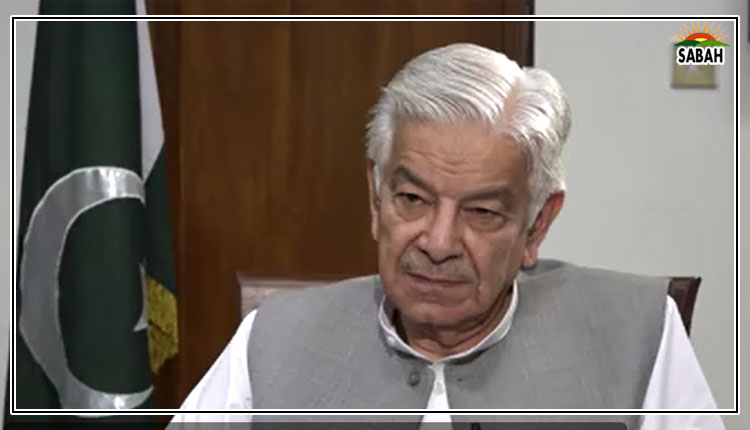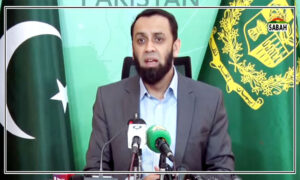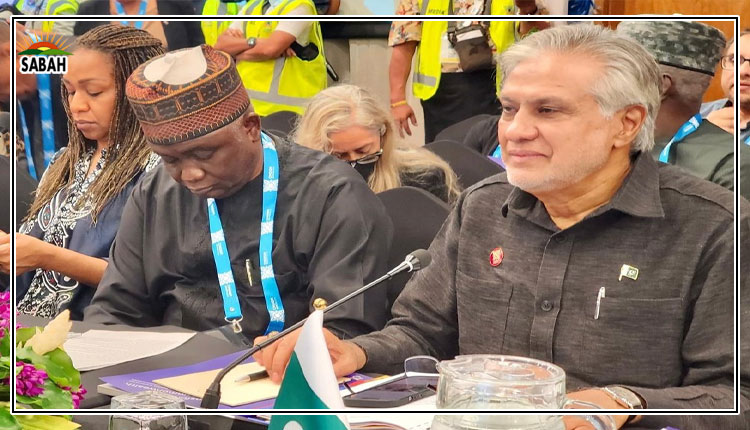Ishaq Dar emphasizes the critical importance of transforming the workforce across the Commonwealth
SAMOA, Oct 24 (SABAH): Deputy Prime Minister and Foreign Minister Senator Mohammad Ishaq Dar has reaffirmed Pakistan’s commitment to strengthening democratic institutions, fostering economic growth and addressing the urgent challenge posed by climate change.
Ishaq Dar expressed these views while addressing the Commonwealth Foreign Affairs Ministers Meeting held in Apia, Samoa on Thursday.
The meeting brought together the Foreign Ministers from across the Commonwealth in the lead up to the Commonwealth Heads of Government Meeting to deliberate on key issues facing the Member States.
The Deputy Prime Minister presented Pakistan’s perspective on several critical issues on the agenda of the Commonwealth, including resilient peoples and societies, strong democratic institutions, robust economies, and environment.
He underscored the importance of collaboration among Commonwealth nations in building societies that can withstand and adapt to global challenges.
He also expressed Pakistan’s full support to the Commonwealth and its commitment to working with member countries to develop robust solutions to common challenges.
Ishaq Dar called for increased investment in digital infrastructure and transformative technologies to accelerate economic modernization and enhanced productivity across the Commonwealth.
Addressing the Commonwealth Business Forum in Samoa, he underscored the crucial role of the Commonwealth Business Forum as a platform for collaboration, trade, and investment, impacting millions across the Commonwealth.
The Deputy Prime Minister emphasized the critical importance of transforming the workforce across the Commonwealth.
He called for urgent investment in education, skill development, and entrepreneurship to harness the potential of our workforce, which is a key driver of technological innovation and economic transformation.
Ishaq Dar reaffirmed Pakistan’s commitment to contributing to the prosperity of the Commonwealth and called for a shared vision for sustainable growth, enhanced intra-Commonwealth trade, and economic and social progress.
He also highlighted Pakistan’s national efforts aimed at empowering its workforce and to prepare it for a rapidly evolving global economy.
Ishaq Dar said that the Commonwealth Business Forum stands as a beacon of collaboration and innovation for our shared community. It is a unique platform, that enables us to address issues of economic development, trade, and investment, while fostering deeper cooperation across the 56 member nations. The work being done here, directly impacts millions of people across the Commonwealth, advancing prosperity and resilience in our respective economies.
The theme of today’s session, “Transforming Our Workforce,” is not only timely but also crucial. Our workforce is the backbone of our economic development and a key driver in achieving inclusive growth. Across the Commonwealth, we share a common asset—our youth.
Ishaq Dar said that over 60% of the Commonwealth’s population is under the age of 30. This demography represents immense potential, a generation ready to reshape industries, drive technological innovation, and lead the next wave of economic transformation. However, to harness this potential, it is imperative that we invest in education, skill development, and the digital economy. We must ensure that our workforce, particularly our youth, is equipped with the tools necessary to thrive in a rapidly changing global landscape. Furthermore, promoting entrepreneurship, building resilient economies, and fostering an inclusive environment; where all can contribute meaningfully, must be at the heart of our endeavors.
Ishaq Dar said that as we look to the future, we must recognize the critical role that a strong, well-prepared workforce plays in building sustainable economies. A workforce that is skilled, adaptable, and empowered is the cornerstone of economic resilience. By investing in human capital and ensuring equitable opportunities for all, we will not only strengthen our own economies but also contribute to the prosperity and stability of the wider Commonwealth community.
Ishaq Dar said that for my country, Pakistan, where more than 65% of the population consists of youth, and is a significant contributor to international market, as an exporter of more than 12 million workforce, harnessing our youthful demographic, is even more important. Recognizing this fact and to ensure that our youth is equipped with skills that align with the rapidly evolving global economy, and vital to drive economic transformation, we have made certain interventions at various levels, including within our education, and economic ecosystems. These initiatives, aimed at empowering the youth, offer valuable insights for our Commonwealth Aiga {/ɑːˈiːŋə/ (Samoan word for family)}.
Ishaq Dar said that Education Reform Initiatives in Islamabad Capital Territory (ICT), along with similar efforts nationwide, have been launched to elevate the quality of education through a range of strategic programs. These reforms, prioritize modernizing educational infrastructure, expanding access, and promoting innovation and inclusivity. Collectively, these measures aim to build an education system that is inclusive, equitable, and transformative, providing every individual with the opportunity to realize their potential and contribute to a brighter future for Pakistan. These initiatives are more than mere projects; they reflect a steadfast commitment to overhauling the country’s education system. The goal is not just to construct schools, but to nurture dreams, hopes, and a promising future for our next generations.
Ishaq Dar said that targeted interventions in educational institutions, emphasize holistic growth, physical health, and mental well-being. Key initiatives include the Prime Minister’s Health & Hygiene Initiative, the School Meal Programme, the E-Ta’aleem Portal for blended learning, and the creation of High Impact Labs, Digital Hubs, and Google Centers of Excellence to train students in cutting-edge technologies, expanding tech-enabled learning in rural areas, and bridging the digital divide. Additionally, software Technology parks are being developed to provide free co-working spaces for freelancers and boosting Pakistan’s digital economy. Other interventions focus on financial literacy, teaching coding and artificial intelligence (AI), and offering foreign language labs to equip students with the skills necessary for a dynamic global environment.
He said that another such initiative is the Prime Minister’s Youth Programme (PMYP), which offers diverse opportunities in 4Es; Education, Employment, Engagement, and Environment. It empowers our youngsters to study, grow, and broaden their skillset. Besides financial support, it provides skill training to our youth in key sectors like IT, agriculture, and entrepreneurship. We have focused on providing employment opportunities to our youth so that can contribute to the nation’s socio-economic progress. A prominent aspect of this Programme is the Youth Business and Agriculture Loan Scheme, which offers affordable credit to young entrepreneurs, particularly in rural areas. This program addresses economic disparities and encourages entrepreneurship, making it a model for our Commonwealth peers to stimulate local businesses and promote rural development.
Ishaq Dar said that as Pakistan seeks to enhance competitiveness in global markets, entrepreneurship development is central to our strategy for transformation of our workforce. We are striving to equip our workforce with the financial tools, skills training, and mentorship necessary for success. Through initiatives like ‘Skilling Pakistan’, we are collaborating with various organizations, to provide market-relevant training in IT, digital technologies, advanced manufacturing, and green industries. This focus on skill development, helps create a workforce prepared for both local and international demands. offering valuable lessons for other Commonwealth countries who are faced with a similar challenge. Additionally, by simplifying regulatory processes, improving infrastructure, and attracting foreign investment, Pakistan is creating an environment conducive to job creation and business growth. Pakistan’s collaboration with the Commonwealth Secretariat’s AI for Youth initiative, for example, highlights how investing in emerging technologies can prepare youth for leadership in the global digital economy.
Ishaq Dar said that understanding the significance of vocational training, in driving productivity growth, we have paid attention to this important component of workforce competencies since long. In addition to the Prime Minister’s Youth Programme, the National Vocational and Technical Training Commission (NVTTC), along with Provincial Vocational & Technical Authorities, plays a key role in developing qualification frameworks, offering training, and maintaining strong ties with industry. This collaboration is essential for analyzing job market trends and informing the skilled workforce about manpower demands, both locally and internationally. Over the past 18 years, these authorities have developed more than 300 qualifications and established over 4,200 institutions across Pakistan, in both the public and private sectors, serving approximately 0.5 million individuals. Furthermore, they have set up 550 smart labs, accredited 655 national and 10 international institutions, and established five Centers of Excellence. These centers have trained more than 0.6 million high-tech workers, with an impressive employment rate of over 70%. Guided by the requirements of the local and regional markets, we are now formulating a strategy to make thematic interventions for human resource development. While, we have come a long way, I still believe there is need for more comprehensive and levelled approach.
Ishaq Dar said that the youth in the Commonwealth Member States represent a vital demographic. This significant proportion offers both opportunities and challenges for the Commonwealth community. On one hand, young people bring energy, innovation, and the potential for driving economic and social progress. They are central to efforts in building sustainable, resilient economies across the Commonwealth, particularly as many member states are emerging markets. On the other hand, ensuring access to quality education, skill development, and employment opportunities is critical to fully harnessing this potential.
He said that in conclusion, the transformation of our workforce is not just an economic necessity, but a strategic imperative for the future prosperity of the Commonwealth. We must prioritize equipping our youth with the skills and opportunities, needed to thrive in an increasingly digital and interconnected global economy. By investing in education, technology, and entrepreneurship, we empower the next generation to lead with innovation and resilience. “As you engage in the upcoming panel discussion, I encourage you all to reflect on the challenges and opportunities ahead, and to explore actionable solutions that will enable our nations to build stronger, more inclusive, and sustainable economies for the benefit of all. Together, through collaboration and shared commitment, we can drive a future where our workforce is not only transformed but empowered to shape a brighter future for the entire Commonwealth Aiga” Ishaq Dar said.












